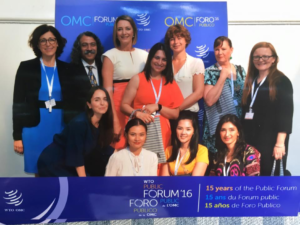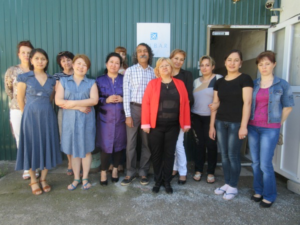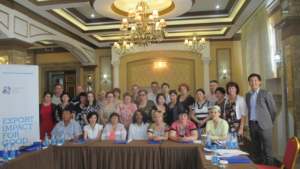Gender balances have played a role in the world of fashion, giving emphasis to men consumers as well, yet, fashion has, since time eternal, been working to cater to women as they are primary consumers and, decision makers in choices made for an entire family. When I hear about the gender imbalance or, women not getting enough opportunities in the businesses, I feel, the fashion industry has been much ahead of others in terms of participation of women at all levels. I had presented my thoughts at WTO Public Forum panel coordinated by SPINNA, “Leading the Way for Inclusive Trade through Innovation in Fashion and Textiles: Can women entrepreneurs become a norm than exception” in 2016. This article builds on the case presented there.

Panelists with SPINNA Team @ WTO Public Forum
During my tenure at the National Institute of Fashion Technology, (NIFT) in India, I have marvelled at the fact that, while the other industries aspired to balance the men women ratio, fashion industry has had sizeable women leaders. Majority of the students at NIFT were women and a large number of them have acquired leading positions globally as designers, entrepreneurs, marketers, merchandisers, production heads, consultants, buyers, academicians in the industry. At the institute, academicians, technical staff and management, women and men, worked together shoulder to shoulder to build the institution and its global reputation. It was a pleasure to work with the women colleagues with exceptional abilities and immense contribution to the field.
When we look at the industry, the popular perception is that women get very few opportunities to rise to higher positions. While this may be somewhat true, partly in South Asia, our consulting work in other parts of the world has provided us opportunity to closely see how women are playing an equal, if not greater role in the business of fashion and apparel. Jack Ma of Alibaba has credited his company’s success to one amongst other ‘sauces’ as, the higher number of women within his teams and he highly recommends greater engagement of women in businesses. The fashion industry, since its’ nascent stages, seems to have incorporated this one secret ingredient of success. Due to its’ less heavy processes and delicate, creative component, apparel and accessories did nurture and in turn, got nurtured more by feminine inputs.
Women thought leaders and business heads have contributed to the world fashion market at all stages of it’s development. In the history of fashion, designers and fashion icons have pioneers who left a brazing trail and are legends. Who can speak of fashion without thinking of Coco Chanel, Frida Kahlon and, Ritu Kumar in the Indian context.
Along with design, retail and marketing, if we talk of production for apparel and fashion industry too, belief that women do not play a large role in manufacturing is a myth. The number of women engaged in manufacturing of fashion products is large not only at the worker level, but, they also played important role at higher positions as entrepreneurs, managers and technologists.

The Management Team of Dilbar Fashion House and other clothing enterprises after completing Kaizen Training under the International Trade Centre project on Strengthening export competitiveness in Kyrgyzstan
In Central Asia, specially in Kyrgyzstan the garment industry is mostly run by women entrepreneurs and managers. I found them very competent, passionate and eager to learn.

In Vietnam, Myanmar, Guatemala, Romania, China, and Fiji Islands I have seen women leading this industry. During our projects, I was pleasantly surprised to see the participation of women entrepreneurs and managers in Myanmar garment industry. They are contributing at all levels, starting from sewing machine operators, supervisors, managers and directors. Women led, managed and run enterprises are playing a great role in the shaping of economies of these countries. We firmly believe that the apparel manufacturing industry in several parts of the world can take inspiration from these countries in terms of women’s participation in supervisory and managerial level.

Representatives of garment manufacturing companies after presenting the results of Productivity and HR Systems Training under Business Innovation Facility Project in Myanmar supported by UK Aid
Women constitute almost 80% of the workforce in most of the garment factories. There is a need for greater representation of women in supervisory level, which traditionally is male dominated in many cultures. In North India and Bangladesh, for example, there are very few women supervisors and manufacturing managers. There have been some initiatives to train and promote women in supervisory role. During our skills training system implementation projects with leading garment manufacturers, we have encouraged the management to nominate women operators to get trained as trainers. These trainers, equipped with scientific training skills have developed amazing capabilities. They can turn an unskilled unemployed person in to semiskilled operator within a few weeks’ time, who no longer should worry about feeding the family. Looking at the confidence and contributions of these women trainers, many factories have started promoting them as supervisors or technicians. These trainers have also been able to support existing experienced operators to improve productivity. It is earning them much needed recognition at work as well as home.
Women surely are key players in the economies of the countries where fashion and textiles are contributing factors to growth. Hence, Jack Ma’s advice should further be taken seriously and greater opportunities for women, to shoulder the responsibilities be created. Once women acquire cutting edge skills, nobody can stop them from reaching their rightful place and their work speak for itself. Greater participation of women in supervisory and managerial positions in manufacturing will also go a long way to creating a secure and healthier workplace largely dominated by women workforce in the garment manufacturing industry.
Dr Rajesh Bheda is Managing Director of Rajesh Bheda Consulting, a management consultancy firm focused on performance improvement in the garment industry. Formerly, he was professor and chairperson, Fashion Technology Department, at the National Institute of Fashion Technology, India. He can be contacted at drbheda@rajesbheda.com.
Rajesh Bheda Consulting Pvt.Ltd.
170 C, 1st Floor, Tower B1, Spaze ITech Park,
Sohna Road, Gurgaon, India 122002
Copyright @2024 Rajesh Bheda Consulting Pvt Ltd
